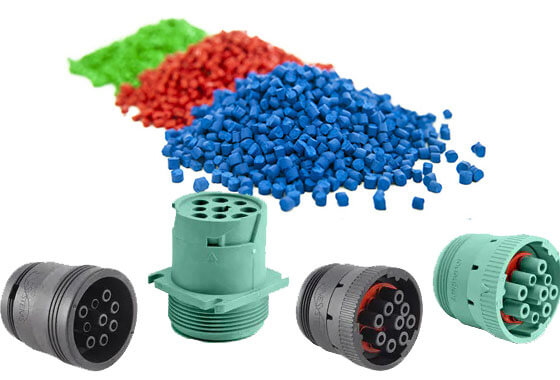The choice of insulating materials used for connectors varies greatly depending on the environment and application. If you need custom connectors, do you know how to choose the most suitable material? The following information will briefly introduce you to the characteristics and applications of several insulating materials that are commonly used for connectors. I aim to provide you with the assistance needed in choosing the right product.
At present, the frequently used insulating materials for automobile connectors are PBT, ABS, PA6/PA66, PPS, PET, etc.
Contents
PBT
The first insulator on my list is Polybutylene terephthalate (PBT) which is used after being reinforced with 15% to 30% glass fiber and is found to be anti-cracking, anti-impact, and anti-electric ability.
Properties
PBT demonstrates good resistance to wear, oil, as well as chemicals. The material also comes with a low friction coefficient and suitable lubrication effect. Under high temperature and humidity, PBT demonstrates good dielectric strength too. The material’s shrinkage is between 0.6% and 3.0%, and its temperature resistance is about 230 ℃ (446 ℉). In addition to all of this, PBT also has good formability. All these factors make it a suitable material to be used for connectors.
Halogen-free PPS
Next, I will be talking about Halogen-free polyphenylene sulfide (PPS), an organic polymer with multiple uses.
Properties
Halogen-free PPS depicts excellent mechanical properties and good dimensional stability. It showcases both exceptional strength and high rigidity. This particular material possesses inherent resistance to flame and can be used at temperatures as high as 200 °C(392℉). It is also resistant to chemicals. Halogen-free PPS is another commonly used material for connectors.
ABS
The Acrylonitrile-butadiene-styrene (ABS) polymer is composed of the three monomers it has been named after. It also happens to be the third material I am going to be discussing.
Properties
ABS presents with excellent resistance to impact. It is also resistant to chemicals, oil, and wear. This polymer is heat stable 2 and can bear temperatures as high as 100 °C(212℉). This material is easy to mold and demonstrates great hardness and rigidity. It also has high dimensional stability. When it comes to prices, ABS costs less than Nylon and is generally used in connector accessories.
NYLON66 (PA66) / NYLON6T (PA6T)
Let’s talk about Nylon next. A well-known polyamide polymer, it comes in different varieties and has multiple uses.
Properties
Nylon offers good strength and possesses the quality of self-lubrication. It also demonstrates good resistance to chemicals, oil, water, and corrosion. When it comes to toughness, PA6T is better than PA9T, and it deforms at temperatures as high as 290°C(554℉). On the other hand, products made using PA46 possess high strength and toughness and are difficult to crack. Nylon is another material that is widely considered for manufacturing connectors.
When designing plugs, different materials can be selected per varying needs. Reinforcing polymers with various substances such as flame retardants or glass fiber plays a significant role in obtaining a more robust, more suitable material.
Reinforced Flame Retardant Grade PET
Another insulator that made it onto my list is Polyethylene terephthalate (PET), a polymer that belongs to the polyester family.
Properties
On its own, PET is resistant to chemicals and moisture, is strong and is an excellent electrical insulator. Reinforced PET depicts heat resistance, and it can be processed over a wide range of temperatures. It also offers good dimensional stability and excellent processability. This reinforced polymer is also frequently used as a connector material.
Glass Fiber Reinforced PPS
The final material on my list is Polyphenylene Sulfide (PPS) reinforced with glass fiber.
Properties
This material is found to be very rigid. It is resistant to high impact, high heat, chemicals, and solvents. Reinforced PPS also absorbs very less moisture and can conveniently be used in areas with high humidity. The material also possesses good tensile and flexural strength. This composite can also be used as connector material.
After shedding some light on the different types of insulating materials used in the manufacturing of connectors, I have proceeded to summarize the information in a tabular form. The table below compares the advantages and disadvantages of each of the materials mentioned above. My goal is to make the decision-making process as easy for you as possible.
| Material | Advantages | Disadvantages |
| ABS | Good anti-impact performance, chemical resistance, heat-stable at 100 °C(212℉), low price. | The organic solution has poor resistance and lacks long-term thermal aging resistance, so it is not suitable for most connectors. |
| PA66/PA6T | Good fluidity, heat resistant, tough, resistant to impact, chemicals, oil, water, and corrosion. | Poor hygroscopicity and dimensional stability. |
| PBT | Good flow, smooth, good electrical and chemical resistance, thermal performance. | High shrinkage, easy to heat under load (increased fiberglass state is often used). |
| PET | Compared to PBT, it has reduced warping properties and is more resistant to high heat than, good electrical insulator, resistant to chemicals and moisture. | Its fluidity is worse than that of PBT, sensitive to humidity in the air (worse than the crystallinity of PBT). |
| PPS | Dimensional stability, tensile and flexural strength, rigid, inherent flame retardancy, stable at temperatures as high as 200 °C(392℉), resistance to chemicals, solvents, and impact. | High brittleness, poor toughness, and low strength. |


